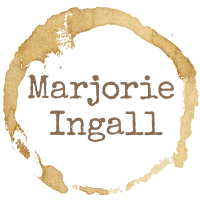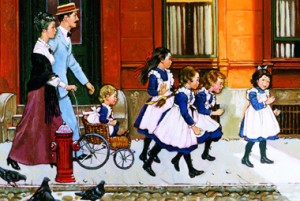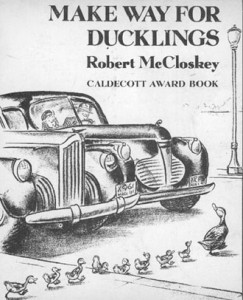For this week’s Tablet magazine column, I loved chatting with Dr. June Cummins and reading her smart academic work on All-of-a-Kind family. Cummins is AOKF author Sydney Taylor’s official biographer. She has fascinating insights into how Taylor’s socialism and progressive politics inform the books, and into how the progression of the All-of-a-Kind books (written from the 1930s to the 1970s) depicts changing attitudes toward both parenting and Jewish identity.
So I had a hard time constraining myself to a non-insane word count in this week’s column. Um, I had a lot of ideas.
After I filed, my editor called. This approximates our conversation:
Editor: This is the most inside-baseball thing I have ever read.
Me: To YOU. Because you didn’t grow up in America and you have a penis.
Editor: I’m sorry, you sound like a ranting crazy person in this piece. You’re assuming way too much knowledge on the part of the reader. You have to explain what this book is and why it is important.
Me: I CANNOT BELIEVE YOU ARE SAYING THIS.
Editor: I asked someone else here we agree it’s totally obscure.
Me: BECAUSE HE ALSO HAS A PENIS! DID YOU ASK A WOMAN? YOU DIDN’T ASK A WOMAN!
Editor: Don’t you want EVERYONE who reads this piece it to get it? Not all our readers are women.
Me: NOW YOU KNOW WHAT IT’S LIKE TO BE A WOMAN! LET MEN BE THE OUTSIDER FOR THIS ONE PIECE! LET THE DEFAULT BE FEMALE FOR ONE FREAKIN’ STORY!
Editor: Even if every woman knows these books as well as you do, which I doubt, I cannot let you write a story that is incoherent to 50% of our readers.
Me: But even the GOYIM love this book! This is the most important Jewish children’s book EVER WRITTEN!
Editor: If I were writing about Star Wars I would still explain Star Wars to people who don’t know Star Wars, and this book is nowhere near as important as Star Wars.
Me: GAAAAAAAAAAAAAAAAAH!!!!
Far be it from me to sound all Auslanderish about the editing process. But now that I’m out the other side, I must admit that maybe my love of the books clouded my writerly judgment a weensy bit. I perhaps had too many ideas and too much um exuberance going on in my first draft. Still, I’m bummed that so much fascinating material didn’t fit into the second draft. (So do a Google search for June Cummins, and noodge her to finish her book.) In any case, I cannot overstate how happy you will be if you pick up AOKF and share it with your kids. As I’ve said before, a huge and unexpected joy of parenting has been reading bedtime books to my now-big girls — 9 and 6. Discovering great new books, introducing the books I loved to the girls and finding that they love them too….bliss.



Loved both this posting and the column in Tablet. It was fun sharing AOAKF with both my girls and plan on taking my 9 year old to the ‘hood this February when we come to NY to visit our eldest and his wife on the UWS!
I neither grew up on Tatooine nor have a penis, but I had never heard of these books until YOU told me about them, about 10 years ago, and since I don’t have kids, I’m ashamed to say that I still haven’t read them. I swear to rectify this immediately. In the meantime, STOP OPPRESSING ME!
Henny was my favourite. Sigh…. love….
My informal survey of my mostly-Jewish, all-American mom friends is that I am in the minority in reading, remembering, and loving these books, and the fact that my (admittedly lousy) library has ONE COPY of the first book and it’s practically a first edition confirms it–these books are, sadly, not the touchstone that the Little House books are. There we are, marginal again. But I’m dying to read a biography of Sydney Taylor–reading AOKF with my girls (5 and 7) recently, I found myself wondering how Charlie and Kathy the Library Lady both ended up on the Lower East Side, and realizing that while Charlie was slumming, Kathy was clearly a Progressive do-gooder. (And luckily my girls have no patience for long descriptions where nothing happens, so I could just skip the part about Polack.)
I wish you could post the unedited version of your article, I’d read it! I always adored these books as a kid, borrowing them so often from my temple’s library that I wonder if anyone else ever got to read them! I always felt like they were written just for me. They resonated for me in much the same way the Ramona books did, dealing with real people going through the same things as I did (sibling squabbles, money worries, great happiness in basic things like buttons).
It’s a shondeh that all but the first book are out of print. But I also seem to recall that the first two were by far the best.
Amalia, I should say that I love my editor, and I do believe most writers do better with the back-and-forth of editing than they would just, y’know, spewing into the void. (That’s blogging.) (Which I’m doing RIGHT NOW!)
You are so right about Ramona. I was shocked to discover that in some ways they are BETTER than we remember — the money worries that pervade the books, the truly kidlike anxiety over things that would seem insignificant to an adult, and the sense that sometimes life is just unfair and sucky and that’s how it is — all that intensity and depth of feeling impresses me so much more now than it did when I was small.
Absolutely! I always loved those books as a kid, but they get better and better from an adult perspective. The thing that’s always struck me too, especially about the Ramona books but also the AOKF ones, is how much both authors respect those feelings in children. They really appreciate that children do notice all of these parts of life, both problematic and joyful, and respect the significance that they invest in all of these experiences. Have you ever read Beverly Cleary’s autobiographies? They are two of my favorite books ever, and explain so much about her writing. I would so love to read a Sydney Taylor biography!
When I re-read Ramona as an adult I was absolutely floored by how contemporary some of them felt. There’s one book where the Mom forgot to turn on the crock pot that morning so they come home to find no dinner. The parents then make pancakes and get into a stupid, pointless, absolutely titanic argument over basically nothing.
I swear to God I think I have HAD that argument with my spouse. It is hilarious and painful to read as an adult.
There’s also a fascinating line in which Beezus and Ramona are talking about their father’s attempt to get a BA as an adult so he can be a teacher. Why, Ramona asks, didn’t he finish college when he was young? “Because he got married, silly,” Beezus says. “And then they had me.”
That line was there when I read it as a kid, but it flew entirely over my head. One of the things that I love about these books as a grownup is the way they show a family that is not poor in any sort of dramatic or romantic way but that is struggling in a very prosaic, frustrating, ordinary way. Dad lost his job; Mom found one but it kind of sucks; they have to send the kids to a really substandard daycare arrangement with a neighbor because that’s what they can afford; they have to struggle just to find ways to pay for ordinary stuff like haircuts for the kids. The only thing that feels dated is the particular hairstyle Beezus covets, and the TV ads that Ramona likes so much.
I second Marjorie and Amalia on the Ramona books!! A friend of mine and I both started reading them to our 5-year-old daughters this summer. I loved them still – maybe more. My friend said she was disappointed in them and that they were not as good as she remembered. So hard for me to believe! We also took our girls to the Ramona movie this summer, which was the perfect first-ever-movie-in-the-theater for a sensitive child.